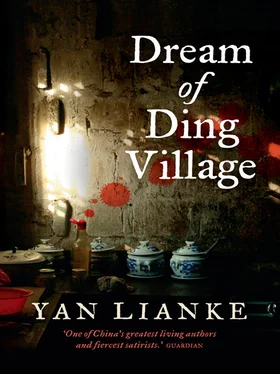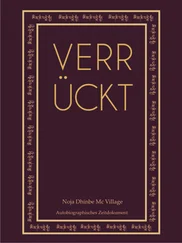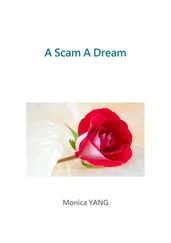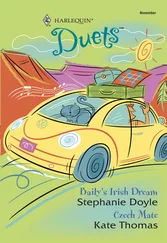Uncle’s courtyard gate was unlatched, but instead of walking in or shouting to see if anyone was home, my father pounded on the wooden gate with his fist. When no one answered, he knocked more loudly.
‘Who’s there?’ my uncle called from inside the house.
‘Liang, it’s me. Come outside for a minute.’
Dressed in a pair of white cotton underpants, Uncle went out and opened the gate. He seemed surprised to find his brother standing there. ‘Oh, it’s you,’ he mumbled groggily.
‘I got those coffins Tingting asked for,’ my father said coldly. ‘Two Grade-A coffins with carvings of houses, buildings and appliances. I’ll wager no one in her family has ever had such a fancy, expensive casket.’
Still only half-awake, Uncle stared at his brother in silence.
‘Is it true what I’m hearing? That you willed this house and courtyard to Ding Xiaoming?’
Uncle was suddenly wide awake. Without answering, he turned his head away, darting sideways glances at his brother and at the courtyard.
From his pocket, my father produced the marriage certificates, printed on shiny red paper. He flung them at my uncle through the open courtyard gate. They hit Uncle in the chest, clinging to his naked skin for just a moment before fluttering to the ground like falling leaves.
‘You ought to be ashamed of yourself,’ my father hissed. ‘You could die any day now, and here you are, signing away the family property and raising all kinds of hell over a woman. You’re going to die without descendants, and there’ll be no one to make offerings at your grave. You’ve got nothing to live for, so why don’t you just die now?’
My father spun on his heel and began to walk away. After he had taken a few steps, he glanced back at Uncle. ‘Four divorce certificates plus two marriage licences. Do you know what those six pieces of paper cost me? I had to promise the official one of my most expensive coffins, for free!’
This time the words were not hissed, but shouted. My father stalked off without looking back. He was the same father I’d always known, a skinny man, lean as a sheet, but now that he could afford to buy his clothes in the city, he dressed a little better. He wore an unlined blue jacket with upturned collar and contrasting red stitching, and a pair of grey cotton trousers, neatly creased. My mother must have laid out the jacket and folded the trousers very carefully to get them to look like that, because she didn’t own an iron.
My father’s clothes set him apart from the other villagers. He looked like a city man now, a county cadre who worked in the city. Then there were his shoes, his shiny black leather shoes. A lot of the village men wore shiny black shoes, but they were mostly imitation leather. If they were real leather, they were probably pigskin. But my father’s shoes were made from real cowhide, the genuine article. They were a gift from someone for whom he’d helped procure coffins. The black patent leather had been polished until it shone like a mirror. As my father strode through the streets, the trees and houses of Ding Village were reflected in his shoes. Although, of course by then, there weren’t many trees left, so the trees reflected in his shoes were mostly tiny ones.
After he had watched my father turn the corner, Uncle seemed to regain his senses. He bent down and picked up the marriage booklets. Flipping through their pages, he found nothing new. They were nearly identical to the ones he and Song Tingting had received so many years ago. Only the date and one of the names had changed. The differences were so minor that Uncle began to feel like remarriage was a bit of an anti-climax, a futile exercise. For a few moments, he stood in the courtyard, feeling disappointed. When he turned around, he saw Lingling standing behind him, looking very pale. Uncle realized that she must have heard everything his brother had said, and seen him throw the marriage certificates. She looked like she’d been slapped across the face.
‘If I’d known it was such a hassle, I wouldn’t have bothered,’ Uncle groused.
Lingling stared at him but said nothing.
‘I mean, fucking hell, who cares if we shack up or get buried together without a marriage licence? What are they going to do, chop our heads off? Dig up our graves?’
‘You think they’d bury us together if we weren’t married?’ Lingling asked. ‘Your dad and brother would never allow it.’
Lingling took the booklets from Uncle’s hand and scrutinized them closely. After she had looked through all of the words and pictures, she wiped the dirt off carefully, as if she were washing her own face.
3
Oddly enough, as soon as she and Uncle had their marriage certificates in hand, Lingling’s temperature retreated. Her fever went down and her strength returned. It was as if she were cured, as if she were well again. Although she was still far too thin, she had regained her spirit, and some of her former glow.
After my father left, Lingling and Uncle went in for a nap. Uncle fell asleep quickly, and awoke to find Lingling sitting on the edge of the bed, waiting for him to wake up. While he had been napping, she had wiped down the furniture, laundered their clothes and given the floor another sweeping. She had even found time to go out into the village and buy a few packets of cigarettes and several pounds of festively wrapped fruit candy.
When Uncle saw Lingling sitting on the edge of the bed and smiling, he asked: ‘What’s with you?’
Lingling laughed. ‘I’m better. My fever’s gone.’ She took his hand and placed it on her forehead so he could feel. ‘Now I want to go out and tell everyone in the village we’re married!’
Uncle put his hand to her forehead again, wondering if she was delirious.
Lingling grabbed the bag of candy and plopped it down on the bed.
‘Liang, Daddy, I swear I’m much better. Let’s go into the village and tell everyone we’re married. Because of the fever, I know we can’t have a big celebration, but the least we can do is pass out candy and cigarettes and tell everyone the good news!
‘Even though it’s a second marriage for both of us, I’m only twenty-four, so it’s kind of like a first marriage for me,’ she enthused. ‘Come on, let’s make the rounds and tell everyone! When we come back, I promise to call you Daddy a hundred times, as many times as you want.
‘Hurry up, Daddy,’ she tugged at his hand. ‘Don’t you want to come back home tonight and hear me call you Daddy again?’
Taking Uncle by the hand, she led him to the washstand, moistened a towel and began washing his face. She was careful to wipe the corners of his eyes and the sides of his nose, and to scrub the palms and backs of his hands. When this was finished, she picked out a pair of trousers and a shirt and helped him to get dressed. After she had buttoned Uncle’s shirt, she grabbed the bag of candies, took him by the hand and led him out of the door, like a mother taking her child out to play.
Uncle and Lingling went from house to house, announcing their marriage and showing their certificates. They were husband and wife now, and had the booklets to prove it. From house to house they went, spreading the joyous news and passing out candy and cigarettes. At the first house they visited, a woman in her late sixties opened the door, their elderly neighbour. Lingling thrust a handful of festively wrapped candies at the woman, saying: ‘Hello granny, we brought you some wedding candy. Ding Liang and I are married — we just got the certificates. With everyone so sick these days, we can’t have a banquet, but we wanted to come over and tell you the good news.’
At the second house, a middle-aged woman in her forties opened the door. ‘Hello, auntie,’ Lingling greeted her. ‘Liang and I just got married! Because of the fever, we’re not having a banquet, but we wanted to come and tell you the news, and bring you some wedding candy.’ After she had stuffed the woman’s pockets full of candies, Lingling pulled out her marriage certificate and held it up for the woman’s approval.
Читать дальше












